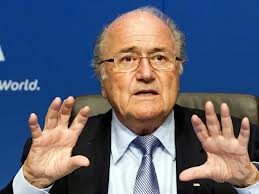By Andrew Warshaw, chief correspondent
May 17 – FIFA president Sepp Blatter has conceded that political interests as well as genuine footballing criteria were in part responsible for Qatar winning the right to stage the 2022 World Cup.
Blatter, who is believed to have voted for the United States, has now admitted that there were “interventions at different levels” when his executive committee decided to take the World Cup to the Middle East for the first time.
“There were interventions at different levels so that it would go to an Arab country,” Blatter said in an interview with L’Equipe. “Geopolitics did its work.”
“Before the awarding of a World Cup or Olympic Games, there is a meeting with the politicians. We had it here in Zurich. They influence the voters.”
Ever since Qatar’s remarkable victory, there have been persistent but unsubstantiated allegations of foul play. Blatter was at pains to stress that nothing underhand took place in the buildup to the ballot, merely that politics plays a part in decisions of such importance.
But he did support a proper investigation of Qatar’s victory if only to show that everything was above board. “Nobody proved that there were payoffs so that Qatar was chosen,” he said in the interview.”The (FIFA) ethics commission can open an investigation. That would be good to prove that this was done correctly.”
In the same interview, Blatter waded once again into the heat debate by stating his personal preference for a winter World Cup. “Whether it’s the right choice, that’s up to the executive committee,” he stated. “”The problem is knowing whether it can be played in June-July in Qatar.”
A winter World Cup has already been endorsed by UEFA president Michel Platini as well as Youssuf Al-Serkal, head of the United Arab Emirates FA and an Asian Football Confederation vice-president. Blatter says Qatar’s much-trumpeted cooling technology and air conditioning only addresses half the problem.
“The World Cup is more than just stadiums, it’s an array of social and cultural activities around the competition,” he said. “What do we do? It’s not rational and reasonable to play in June-July. Our technical report, which was available to all the members of the executive committee before the 2010 vote, exposed these difficulties.”
Despite his latest comments, no-one quite knows where Blatter actually stands on the issue since he keeps putting out conflicting signals. Only two months ago he appeared to suggest that nothing would change and that 2022 would definitely remain a summer event.
Any decision to move to the winter will probably have to be made by 2015, or 2016 at the latest, in order to give national leagues in Europe – most of whom are fiercely opposed to any change – sufficient time to reorganise and refigure their calendars.
Contact the writer of this story at moc.l1745666874labto1745666874ofdlr1745666874owedi1745666874sni@w1745666874ahsra1745666874w.wer1745666874dna1745666874

